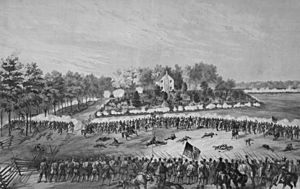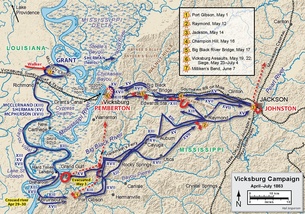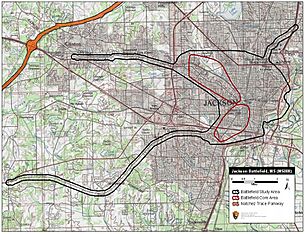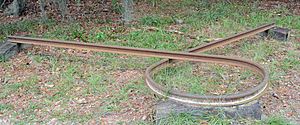Battle of Jackson facts for kids
Quick facts for kids Battle of Jackson |
|||||||
|---|---|---|---|---|---|---|---|
| Part of the American Civil War | |||||||
 The Battle of Jackson, Mississippi by Alfred E. Mathews, 31st Ohio, shows the charge of the 17th Iowa, 80th Ohio and 10th Missouri on May 14, 1863 |
|||||||
|
|||||||
| Belligerents | |||||||
| Commanders and leaders | |||||||
|
|||||||
| Units involved | |||||||
| Jackson Garrison | |||||||
| Casualties and losses | |||||||
| 286–332 | c. 200–850 | ||||||
The Battle of Jackson happened on May 14, 1863, in Jackson, Mississippi. It was a key part of the Vicksburg campaign during the American Civil War. Major General Ulysses S. Grant, a Union Army leader, moved his troops into Mississippi in April 1863. His goal was to attack Vicksburg, Mississippi, a very important city on the Mississippi River.
After a battle near Raymond, Grant realized the Confederate army in Jackson was strong. He sent two groups of soldiers, called corps, to capture Jackson. These groups were led by Major Generals James B. McPherson and William T. Sherman. The Confederate commander, General Joseph E. Johnston, thought Jackson could not be defended. He began to pull his troops out.
Brigadier General John Gregg led the Confederate rear guard. This group fought against Sherman's and McPherson's soldiers in Jackson on May 14. After the fight, Gregg's men also left the city. Union troops then took over Jackson. They destroyed important buildings and military supplies. They also took things from people's homes. Grant then moved on to Vicksburg, which he surrounded and captured on July 4. Johnston tried to help Vicksburg but failed. Union forces later drove him out of Jackson a second time in July.
Contents
Why the Battle Happened
In early 1863, during the American Civil War, Union Major General Ulysses S. Grant planned to attack Vicksburg, Mississippi. Vicksburg was a very important city for the Confederates on the Mississippi River. After some tries, Grant decided to move his army south of Vicksburg. He planned to cross the river and attack the city from a different direction.
In late April, about 24,000 Union soldiers landed in Bruinsburg, Mississippi. Grant's men then moved inland and headed east. Their plan was to turn west later and attack Vicksburg. The Union army moved in three main groups. Meanwhile, Confederate soldiers from all over were sent to help defend Vicksburg. These extra troops gathered in Jackson, Mississippi. On May 10, General Joseph E. Johnston was sent to lead this growing Confederate force.
Lieutenant General John C. Pemberton, who commanded the Vicksburg defenders, ordered one group from Jackson to move. This group, led by Brigadier General John Gregg, went to Raymond.
The Battle of Raymond
On May 12, one of Grant's Union groups, led by Major General James B. McPherson, met Gregg's Confederates near Raymond. The Union won the Battle of Raymond. However, McPherson's actions allowed the smaller Confederate force to fight for a long time. This battle changed Grant's plan. He realized the Confederate army in Jackson was stronger than he thought. Grant did not want to leave enemy soldiers behind him. So, he decided to attack Jackson first.
Grant was not sure if McPherson's XVII Corps was strong enough alone. So, he ordered McPherson to attack Jackson from the northwest. Major General William T. Sherman's XV Corps would attack from the southwest.
Confederate Decisions in Jackson
General Johnston arrived in Jackson on May 13. He had a reputation for being pessimistic. About 6,000 Confederate soldiers were in the city, including Gregg's men who had just fought. More soldiers were expected to arrive. During his trip, Johnston learned that Grant's army was in Mississippi. He also knew that Pemberton's army was defending along the Big Black River. The Union army was now between the two Confederate forces.
Johnston quickly decided that Jackson could not be held. He sent a message to his commanders in Richmond, Virginia, saying, "I am too late." He then ordered his troops to leave the city. Johnston and his staff left by train for Canton, about 25 miles away. The rest of his army walked. Gregg's men were ordered to stay behind as a rear guard to protect the retreat. As he left, Johnston sent a confusing message to Pemberton. He suggested his men would help Pemberton attack, but Johnston had no plan to do so. Some historians believe this was to make it look like he wasn't abandoning Vicksburg.
The Fight for Jackson
On May 14, Union soldiers met the Confederate rear guard about 5 miles from Jackson. A thunderstorm began during the fight. Two Confederate officers, Brigadier General W. H. T. Walker and Colonel Peyton Colquitt, had set up a roadblock. The rain stopped the fighting. During this break, the Confederates learned Sherman's troops were coming. They sent some mounted soldiers to meet Sherman's column.
After the rain stopped, the Union advance continued. The rain delay was important. It kept the paper cartridges, used for bullets, from getting wet and useless. McPherson was not sure how strong the enemy was. He started carefully, using cannons to test the Confederate lines. Once he realized it was not a large force, McPherson ordered Brigadier General Marcellus M. Crocker's division to attack. The Confederates fought back at first, causing about 300 Union casualties. But Crocker's attack pushed the Confederate guards back into their forts around Jackson. Union soldiers soon captured the main defenses too. By the time McPherson's men reached the forts, most Confederate defenders had left. Only the crews of seven cannons remained.
Sherman's advance faced less resistance. Only a small amount of cannon fire met his troops. Sherman sent the 95th Ohio Infantry Regiment to check the Confederate forts. The Ohio soldiers found the forts empty. An African American civilian told them only a few Confederate cannon operators were left. When Sherman's main attack happened, these cannon operators were captured. They turned out to be local militia and armed civilians. Besides the seven cannons McPherson's men captured, Sherman's troops took ten more.
What Happened Next
After taking Jackson, Union soldiers, mostly Sherman's men, destroyed many things in the city. They ruined factories, warehouses, and other places important for the military or economy. Grant and Sherman even visited a textiles factory before Sherman ordered its destruction. They also damaged the iron rails of the Southern Railroad of Mississippi. They did this by bending the rails into circles, which were called "Sherman's neckties." Even though Sherman had ordered against it, soldiers also took things from and burned civilian homes. Between fires set by retreating Confederates and those set by Union troops, Jackson suffered a lot of fire damage. For a while, Grant used the same building as his headquarters that Johnston had used.
Casualties and Aftermath
The number of soldiers hurt or killed in the battle varies in different reports. Historian Shelby Foote said the Confederates lost a little over 200 men. Grant's Union army lost 332 men: 48 killed, 273 wounded, and 11 missing. Other historians, William L. Shea and Terrence J. Winschel, say Union losses were 300 (42 killed, 251 wounded, and 7 missing). They put Confederate losses at about 845 men. The National Park Service agrees with these numbers. Almost all Union losses happened in McPherson's group.
After Jackson was captured, the armies of Johnston and Pemberton were separated. On May 16, Grant's men strongly defeated Pemberton at the Battle of Champion Hill. By May 18, Union soldiers reached Vicksburg and surrounded the city. The siege of Vicksburg lasted until July 4, when Pemberton surrendered. During the siege, more Confederate soldiers were sent to Johnston. He eventually had 32,000 men. This group, called the Army of Relief, did not move to help Vicksburg until July 1. When they reached the Union lines two days later, Johnston decided the defenses were too strong. He did not attack. Johnston ordered a retreat on July 5. On July 7, Johnston's troops returned to Jackson.
Grant sent Sherman with 46,000 men to follow Johnston. This movement, called the Jackson Expedition, reached the city on July 10. Jackson was soon surrounded again. A small Union attack happened by mistake on July 12 but was pushed back. Johnston again left Jackson on the night of July 16/17.
Preserving the Battlefield
The City of Jackson protects 2 acres of the battlefield today. One part is in a public park. The other part is on the campus of the University of Mississippi Medical Center.
 | Victor J. Glover |
 | Yvonne Cagle |
 | Jeanette Epps |
 | Bernard A. Harris Jr. |




